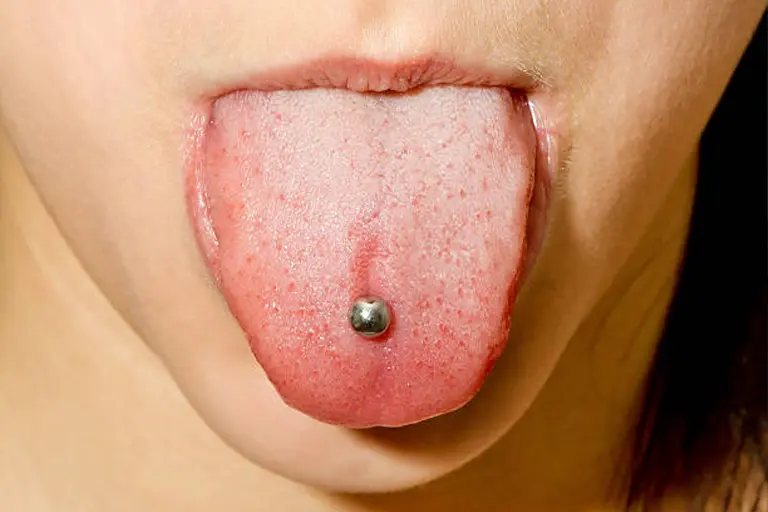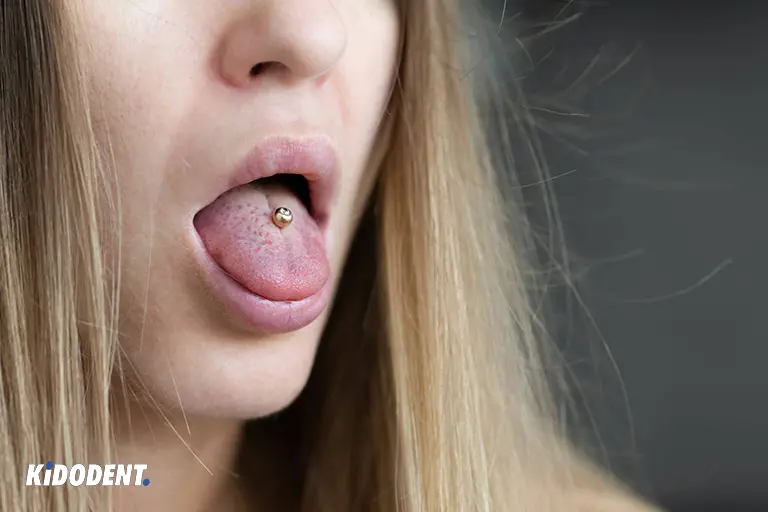Piercing tongue among teenagers and young adults has been a common practice. There are other body piercing types which involve the skin and usually in the outer body parts like the nose. Tongue piercing is different from dermal piercing or skin piercing in that tongue piercing is in your mouth, a moist place and an environment for breeding bacteria. You may find tongue piercing, categorized as intraoral piercing, attractive or just a change to appearance, but It is worth knowing about it a little more.
According to ADA (American Dental Association), tongue piercing is an invasive procedure that is followed by a series of complications and risks to your oral health. It is a form of body art more common among adolescents and young adults, which is followed by negative impacts and complications like swelling, bleeding, oral infections, damage to teeth, excessive saliva, airway obstruction, palatal erythema, and more oral health risks.
5 common risks of tongue piercing
1. Your mouth is where the bacteria is
It is right that even on our skin, small organisms and bacteria can live and exist. But inside your mouth is a sensitive place. Oral mucosa is rich in bacterial activity and any activity that can interrupt or cause problems to the soft tissues in your mouth will have damaging effects on the tongue, gums, and your teeth.
Since tongue piercing is an invasive surgical procedure, any unhygienic and unsterilized procedure can lead to viruses, microorganisms, and bacterial development. This will be an opportunity for microorganisms and serious bacterial infections such as endocarditis and cellulitis to contaminate your mouth. There are risks of certain diseases that can be transmitted into your mouth like hepatitis B and C.
2. Tooth fracture and wear
The most common problem that people who have their tongue pierced experience is fractured teeth and tooth wear. It is because you will have regular and constant contact between your teeth and tongue pierce components. As a result, over a long time, attrition occurs and your teeth can be affected due to this foreign object in your mouth. This is not the end, sometimes, you may bite into your tongue pierce, which you end up with a broken tooth.
3. Damages to the soft tissues
There are veins and nerves in your tongue and any disturbance to your tongue while piercing can leave you not just in pain but excessive bleeding, damage to tongue nerves, tongue defects, wounds, and ulcerations. Whether it is done at the right site of your tongue or not, you need a healing time, which can bother you because of swelling and difficulties that come with that like airway obstruction.
4. Hypersalivation
Hypersalivation or excessive saliva flow is another common problem of tongue piercing. There are saliva ducts just under and around your tongue that are responsible for carrying saliva into your mouth. When there is a foreign object all the time in your mouth like tongue pierce objects, it triggers more saliva flow in your mouth. So, what happens when there is too much saliva flow? Yes, drooling or maybe spitting out that excessive saliva.
5. Receding gums
Tongue piercing damages your gums and causes receding gum, which exposes your teeth and leads to tooth loss. The recession of gums creates a space for plaque buildup and tooth decay in the receding area of your teeth. If your gums recede, it means your teeth are at higher risk for any potential danger from decay and gum diseases.

If you have already pierced your tongue, at least you should know some oral hygiene aftercare tips:
Aftercare for tongue pierce
- Tongue piercing healing: healing usually takes about 4 weeks. You should follow oral hygiene tips to the highest level within this time.
- Use warm salt water rinse for bacterial and infection elimination
- Use oral hygiene products like mouthwashes for better oral health. Avoid using mouthwashes that contain alcohol.
- Keep the tongue and teeth clean, especially around the pierce zone and the pierce objects with a soft-bristled toothbrush.
- Eat soft and watery foods and avoid hot and acidic drinks in the early days of tongue piercing healing. Keep in mind that hot and acidic drinks and foods may trigger irritation of the pierce objects to the soft tissues in your mouth and should be avoided in the long run.
- Avoid smoking and alcohol drinking
- Remove tongue pierce for hard physical activities and when playing sports. You should visit the place you have received tongue piercing for the removal of tongue pierce and doing that at home can be dangerous and should not be tried.
What is the purpose of tongue piercing?
Like other types of body piercing, tongue piercing is a way of self-expression. Some young people may find tongue piercing a way to do modifications on their body as a social and behavioral change. They may even find it sexually purposeful.
Do tongue piercings ruin your teeth?
Tongue piercing will cause abrasion, attrition and damages to your teeth. Tongue pierce components are hard and will lead to destruction and damages on the teeth. Frequent contacts between the tongue pierce object and your teeth will cause chipped and fractured teeth.
Do tongue piercings cause difficulty in speaking?
Tongue piercing is done on your tongue, one of the main articulators to produce speech. So, tongue piercing with its components on your tongue interrupt and cause problems in speaking and producing certain sounds. People will need time to adjust their speaking to this new condition on their tongue.
